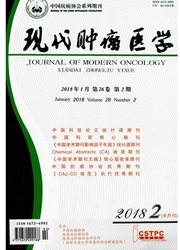

 中文摘要:
中文摘要:
端粒是一种位于染色体末端的特殊结构。端粒能维持细胞基因组功能稳定和细胞分裂。端粒酶能催化端粒DNA复制和延伸而维持其功能。人体绝大多数细胞内端粒酶均处于相对失活或低活性状态。而癌变细胞则可通过各种机制重新激活端粒酶来维持端粒延长,进而导致细胞无限分裂、增殖和对各种放化疗产生抵抗。研究发现抑制端粒酶活性能诱导癌细胞生长抑制和增加其对放化疗诱导细胞凋亡的敏感性。因此端粒酶在一些肿瘤中可能成为治疗新靶点。本文对近10年来包括BIBR1532,T-oligo,Imetelstat,PinX1和Telomestatin等在内的端粒酶关键抑制因子在癌症治疗中的研究进展进行综述,进一步明确它们在癌症治疗中的作用和机制。
 英文摘要:
英文摘要:
Telomeres are complexes composed of nueleotides and proteins and located at the ends of linear chromo somes. Telomere plays a key role in maintaining human genome stability and preventing cell transformation. The func- tion of telomere elongation is mediated by telomerase. Except those special cells such as bone marrow stem cells and so on, normal human somatic cells have inactive telomeras' However,most malignant cells can reactive their telomerase and be- come immortalized and resistance to variety of cancer therapies. Therefore,it is very crucial and urgent to develop potential telomerase inhibitors for cancer therapy. The review focuses on the advances of study on the roles of telomerase inhibition in cancer therapy. We will summarize the usage of the key inhibitors including BIBR1572, T - oligo, Telomestatin, Imetelsta and PinX1 in various cancer treatments,and try to clarify the roles and the underlying mechanisms. We hope that this study can provide useful clues and directions for cancer therapy by targeting telomerase inhibition in China.
 同期刊论文项目
同期刊论文项目
 同项目期刊论文
同项目期刊论文
 期刊信息
期刊信息
